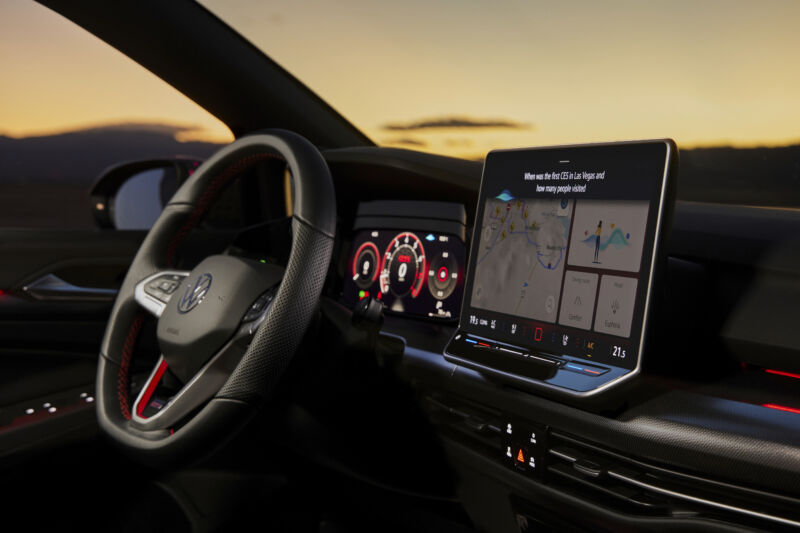
Volkswagen
This year’s Consumer Electronics Show got underway in Las Vegas today. For nearly a decade, automakers and their suppliers have increasingly expanded their presence at CES, such that today, it’s arguably a more important auto show than the once-proud, now-sad, extremely under-attended events held in places like Chicago, Detroit, and Los Angeles. Volkswagen is one of the first automakers out of the blocks with CES news this morning. Working with the voice recognition company Cerence, VW is adding ChatGPT to its infotainment system.
We first experienced Cerence’s excellent in-car voice recognition at CES in 2016—back then, it was still part of parent company Nuance, and the system was called Dragon Drive. Nuance spun Cerence off in 2019, and its conversational AI and natural language processing can be enjoyed in current Mercedes and BMW infotainment systems, among others. I remain in the minority here, but I think it really does make a good alternative to poking away at a touchscreen.
From mid-2024, we can add the VW ID.3, ID.4, ID.5, ID.7, Tiguan, Passat, and Golf to the list of cars with decent voice commands. Using “Hello IDA” as the prompt, VW drivers will be able to control their infotainment, navigation, and climate control by voice, and there’s also a general-knowledge search built in. VW notes that ChatGPT doesn’t get access to any vehicle data, and search queries and answers are deleted immediately. The feature should come to VW electric vehicles if those vehicles already have the latest infotainment system, VW told Ars.
“With software at the core of the Volkswagen of the future, it’s critical that we quickly deploy meaningful innovation powered by advancements in AI,” said Thomas Ullrich, a member of VW’s management board responsible for new mobility. “By leveraging Cerence Chat Pro, we are able to bring added value and a fun and engaging experience to our drivers with minimal integration effort and on a short development and deployment timeline, ensuring our customers are benefitting from new AI-powered conversational technology.”
“We’re proud to build on our automotive expertise and our long-term partnership with Volkswagen to continue to bring new innovation to customers, even post-vehicle purchase,” said Stefan Ortmanns, CEO of Cerence. “It was impressive to see the agility and speed of the Volkswagen team as our companies collectively sprung into action to bring this project to life in just a few short weeks, marking our shared commitment to leveraging advancements in AI to enhance to the in-car user experience.”
VW isn’t the only automaker to think about adding ChatGPT. In March, we discovered that General Motors was experimenting with the tech, and last summer, we demoed a similar implementation in a Mercedes-Benz.
That automaker began a beta program that allowed customers with its MBUX infotainment system to try the improvements to the system’s natural language processing from OpenAI’s tech. I was already a convert to MBUX’s (and therefore Cerence’s) speech recognition capabilities, so I found the improvements took a system that was already better at understanding my voice than either Siri or Google’s and further refined it. I just don’t know whether that will be enough for skeptical car drivers to start talking to their cars.












